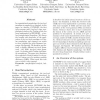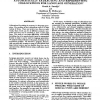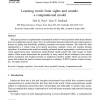210 search results - page 25 / 42 » For the Lexicon that Has Everything |
ICMAS
1998
13 years 9 months ago
1998
Multi-agent models of language evolution usually involve agents giving names to internal independently constructed categories. We present an approach in which the creation of cate...
ANLP
1997
13 years 9 months ago
1997
In computational morphology the two-level paradigm is regarded as a standard in this paper we describe CATMORF, the rst wide-coverage multi two-level steps morphological analyzer ...
RIAO
2000
13 years 9 months ago
2000
In this paper two approaches to knowledge-lite terminology extraction are compared, both involving language filters which are used to remove ill-formed multi-word units (MWUs). A ...
ACL
1990
13 years 9 months ago
1990
Collocational knowledge is necessary for language generation. The problem is that collocations come in a large variety of forms. They can involve two, three or more words, these w...
COGSCI
2002
13 years 8 months ago
2002
This paper presents an implemented computational model of word acquisition which learns directly from raw multimodal sensory input. Set in an information theoretic framework, the ...



